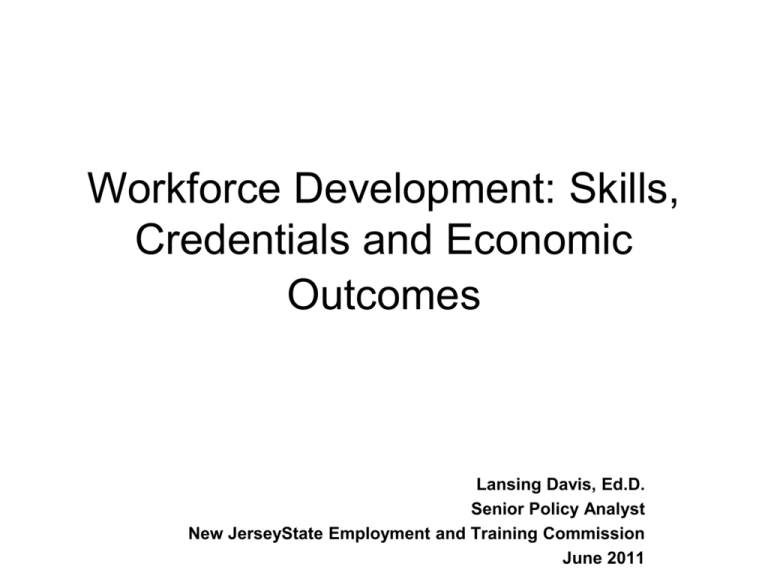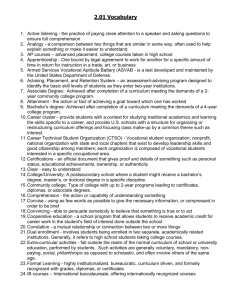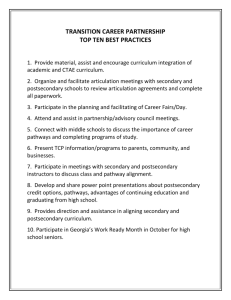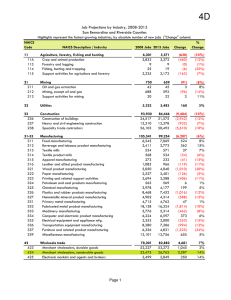College Credit and Workplace Development in These Changing Times
advertisement

Workforce Development: Skills, Credentials and Economic Outcomes Lansing Davis, Ed.D. Senior Policy Analyst New JerseyState Employment and Training Commission June 2011 The future U.S. workforce is here— and it is woefully ill-prepared for the demands of today’s (and tomorrow’s) workplace. Are They Really Ready to Work? Employers’ Perspectives on the Basic Knowledge and Applied Skill of New Entrants to the 21st Century US Workforce, The Conference Board, 2006 Percentage of Adults in the US by NAAL Literacy Levels Below Basic Basic Intermediate Proficient Prose 14 29 44 13 Document 12 22 53 13 Quantitative 22 33 33 13 Source: National Assessment of Adult Literacy, 2003 US Census Bureau, 2008 American Community Survey, 1 year estimates. THE WORK READINESS PROFILE What New Workers in Entry Level Jobs Need to Be Able to Do New workers need to be able to use these EFF Skills… well enough to successfully carry out these critical entry level tasks: Communication Skills Speak So Others Can Understand Listen Actively Read With Understanding Observe Critically Acquire, use and share information accurately and in a timely manner. Interpersonal Skills Cooperate With Others Resolve Conflict and Negotiate Monitor and Correct Performance. Decision Making Skills Use Math to Solve Problems and Communicate Solve Problems and Make Decisions Lifelong Learning Skills Take Responsibility for Learning Use Information and Communications Technology Use appropriate technology to get the job done. Understand Systems. Work as part of a team to achieve goals and objectives. Work through conflict constructively. Provide direct, accurate and timely responses to customer questions and concerns. Take responsibility for completing one's own work accurately, on time, to a high standard of quality. Demonstrate integrity. Avoid absenteeism. Demonstrate promptness. Maintain appropriate grooming and hygiene. Manage time effectively. Cope with a work situation or tasks that change frequently. Identify actual or potential problems related to one's own work: report them, and help to fix them. Learn new/additional skills related to your job. “Not long ago, postsecondary education was a privilege enjoyed by only a few. The economy did not require much more of our grandparents than a high school diploma. Many workers were able to get along well enough without even that. But today, the stakes are much higher. A high school diploma or GED may not be enough for many entry-level jobs and certainly does not provide an avenue to the high-skills/high-wage jobs of choice. Further, the evidence suggests that while our ability to compete internationally depends on the skills of our workforce and its ability to learn and adapt to new situations, the U.S. can no longer claim to be the world leader in education that it once was.” Council for Adult and Experiential Learning (CAEL), Adult Learning in Focus National and State-by-State Data, 2008, http://www.cael.org/adultlearninginfocus.htm. United States Ranking Among 20 High-Income Countries International Adult Literacy Survey (IALS) Literacy Type Prose Literacy Document Literacy US Rank 9th 13th Quantitative Literacy 13th Source: Kirsch, I, Braun, H, Yamamoto, K, America’s Perfect Storm: Three Forces Changing Our Nation’s Future, Educational Testing Service (ETS), 2007. Occupational Educational 2 yr. & 4 Yr. Degrees Occupational/Industry Certifications Postsecondary Certificates Vocational Certifications Work-Readiness Certification GED or HS Diploma Work-Readiness Certification Personal Earnings by Educational Attainment for Persons 25 Years Old and Over: New Jersey, 2008-2009 (Median Income in 2008 Dollars) Personal Income Persons 25 Years Old and Over by Educational Attainment (Two-year moving average) Total Total Less than High School Some college/ Bachelor's Postgraduate or High School Diploma Associate Degree Degree Professional Degree 5,693,200 654,600 1,843,700 1,058,300 1,363,000 773,600 None or negative 30.7% 52.3% 37.5% 27.0% 21.1% 18.3% Less than $10,000 5.0% 5.3% 5.3% 6.9% 4.0% 3.5% $10,000-$24,999 13.0% 24.2% 15.6% 14.0% 7.6% 5.0% $25,000-$49,999 21.7% 14.7% 25.1% 26.4% 22.4% 11.5% $50,000-$74,999 13.3% 2.2% 10.7% 13.4% 17.8% 20.6% $75,000-$99,999 6.4% 0.5% 3.0% 6.2% 9.4% 14.3% $100,000 or more 10.1% 0.9% 2.9% 6.2% 17.8% 26.8% Median Income $41,732 $21,402 $31,799 $38,658 $55,876 $73,872 New Jersey Estimated and Projected Employment by Occupations with Greatest Employment Growth: 2008-2018 Employment Occupational Title Actual Projected 2008 2018 Average Annual Job Openings Percent Total Education/Training Average Requirement Wage ** Home Health Aides 28,700 40,600 41.6 1,480 Short-term on-the-job training $ 11.00 Registered Nurses 79,500 89,650 12.8 2,400 Associate degree $ 36.05 Combined Food Preparation and Serving Workers, Incl. Fast Food Short-term on-the-job training $ 9.40 60,850 68,200 12.1 2,030 $ 12.90 1,230 Postsecondary vocational training $ 17.00 Nursing Aides, Orderlies, and Attendants 51,350 58,500 14.0 Customer Service Representatives 59,400 65,100 9.6 2,440 Moderate-term on-the-job training Accountants and Auditors 42,800 47,200 10.3 1,160 Bachelor's degree $ 38.15 Child Care Workers 40,900 45,250 10.7 1,630 Short-term on-the-job training $ 10.90 Postsecondary vocational training $ 14.60 Bachelor's degree $ 45.20 Short-term on-the-job training $ 11.00 Short-term on-the-job training $ 13.15 Bachelor's degree $ 43.35 Postsecondary vocational training $ 20.50 Short-term on-the-job training $ 13.05 Moderate-term on-the-job training $ 15.75 Hairdressers, Hairstylists, and Cosmetologists 28,400 32,500 14.5 830 Computer Software Engineers, Applications 29,550 33,350 12.8 630 Waiters and Waitresses 57,600 61,250 6.4 3,550 Landscaping and Groundskeeping Workers 37,250 40,800 9.6 800 Network Systems and Data Communications Analysts 10,750 13,750 27.6 490 Fitness Trainers and Aerobics Instructors 13,300 16,200 22.0 530 Receptionists and Information Clerks 48,050 50,950 6.1 1,590 Medical Assistants 12,500 15,200 21.5 410 New Jersey Estimated and Projected Employment by (Education) Occupations with Greatest Employment Growth: 2008-2018 Employment Occupational Title Elementary School Teachers, Except Special Education Teacher Assistants Self-Enrichment Education Teachers Middle School Teachers, Exc. Special and Vocational Education Preschool Teachers, Except Special Education Actual Projected 2008 2018 50,800 46,150 11,300 26,350 14,000 56,500 49,850 14,650 29,200 16,800 Average Annual Job Openings Percent 11.2 8.1 29.7 10.8 19.9 Total Education/Training Average Requirement Wage ** Bachelor's degree $ 60,860 Short-term on-the-job training $ 25,240 Work experience in a related occupation $ 49,610 Bachelor's degree $ 62,060 Postsecondary vocational training $ 33,770 1,730 1,350 510 890 560 Real Time Jobs In Demand Occupation Title 2008 Emp NJ # Cont'g Unemp Claims New Occ Listings NJ Avg Annual Projected Openings (2008 -2010) NJ Avg Hourly Wage Preferred Edu/ Trng Computer Programmers 2,066 3,539 27 380 $37.75 BA Computer Software Engineers, Applications 4,078 2,148 32 570 $43.80 BA Management Analysts 1,865 468 51 330 $42.85 Exp + BA or higher Financial Analysts 2,271 351 59 60 $42.20 BA 913 231 10 180 $47.50 BA 3,135 213 204 740 $36.70 BA Social and Community Service Managers 278 139 41 140 $35.50 BA Compensation, Benefits, Job Analysis Specialists 349 108 6 70 $32.35 BA Training and Development Specialists 372 93 11 120 $31.35 Exp + BA or higher Employment, Recruitment & Placement Specialists 652 70 30 140 $30.60 BA 4,018 46 37 520 $31.95 BA Loan Officers 501 46 34 50 $33.80 BA Credit Analysts 255 39 13 60 $33.90 BA Personal Financial Advisors 997 33 19 40 $43.40 BA 56 27 20 40 $25.00 BA Human Resources, Training, and Labor Relations Spe 367 20 109 160 $32.00 BA Tax Examiners, Collectors, and Revenue Agents 215 19 8 40 $33.25 BA Cost Estimators 248 15 8 100 $32.10 BA 1,506 8 6 20 $41.75 BA Computer Software Engineers, Systems Software Accountants and Auditors Business Operations Specialists, All Other Meeting and Convention Planners Financial Examiners Connecting Work and Education NJ Pathways Leading Apprentices to a College Education Other Workforce Development Stakeholders Educators & Training Providers State and Local Workforce System Employers and Industry Groups Nursing Career Pathway Value-added Education Knowledge Skills Learning Credential/ Degree





